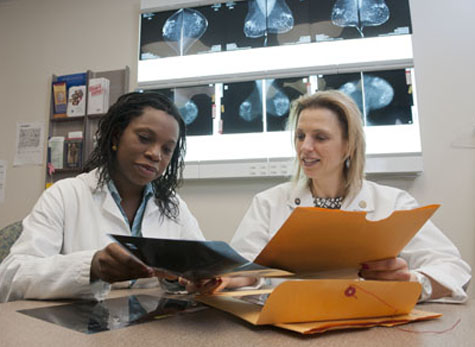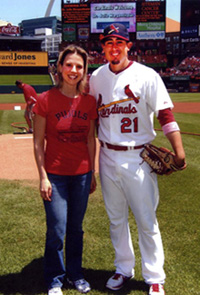
Tim Parker
In addition to a demanding patient schedule, breast surgeon Julie Margenthaler, MD (right), is a devoted mentor to young surgeons, including general surgery resident Lola Fayanju, MD. “Julie’s one of the most motivated and well-organized people I’ve ever met,” says Timothy Eberlein, MD, Bixby Professor and chairman of the Department of Surgery. “She’s like a duck gliding smoothly across a pond. You know she’s got to be paddling like crazy, but you just never see it. So it’s no surprise that she has excelled in every step of her career.”
When Julie Margenthaler, MD, began a surgery residency, she had no interest in becoming the accomplished breast surgeon she is today.
In fact, when her faculty adviser, a breast surgeon herself, asked Margenthaler whether she ever had considered the specialty, she was quick to reply.
“I said, ‘Absolutely not. Just because I’m a woman, I don’t want to be pigeonholed into doing breast surgery. No offense to you, but that’s so cliché,’” Margenthaler, associate professor of surgery, now recalls with a laugh.
It would be another eight years before Margenthaler found her calling as a breast cancer surgeon, but her career choice couldn’t be a better fit. Those who know her say Margenthaler’s surgical talent and extraordinary time-management skills are matched only by her devotion to patients and to mentoring the next generation of young surgeons.
Today, her practice centers on treating young women with breast cancer, who are more likely to be African-American and to have aggressive disease. Newer targeted therapies and combinations of drugs have improved the outlook for many of these patients. And Margenthaler says she is rewarded many times over by her patients’ strength and courage.
“These women are empowered, and they bring a great energy to my practice,” she says. “Yes, there are times when they are frightened — you have to face your mortality when you get a breast cancer diagnosis — but they also have an incredible optimism.”
At the medical school, Margenthaler manages 70-hour work weeks with seamless ease. In addition to blocks of time in the operating room, the clinic and with residents and fellows, she also leads a number of clinical trials, makes time to attend breast cancer support groups and is active in the Susan G. Komen for the Cure foundation on a local and national level.
“Julie’s one of the most motivated and well-organized people I’ve ever met,” says Timothy Eberlein, MD, Bixby Professor and chairman of the Department of Surgery. “She’s like a duck gliding smoothly across a pond. You know she’s got to be paddling like crazy, but you just never see it. So it’s no surprise that she has excelled in every step of her career.”
A circuitous path
A native of Pinckneyville, Ill., Margenthaler’s interest in medicine developed in high school. Her aunt, a nurse at the local community hospital, helped Margenthaler get a volunteer job as a candy striper. Hospital physicians took her under their collective wing, inviting Margenthaler to observe surgeries and tag along on patient rounds.
“It was a great experience,” she says. “I knew early on, before deciding what kind of doctor I would be, that I wanted to work in a hospital. I loved all the activity and the camaraderie among the staff. There’s a lot of excitement and energy, and it seemed like a great way to spend the day.”
Margenthaler earned a degree in biology from Boston University and a medical degree from Southern Illinois University in Springfield. The school excelled in surgical training and was ahead of the curve in using simulators and lifelike mannequins as teaching tools, providing her with a solid surgical foundation.
In 1997, when she began her surgery residency at Saint Louis University, Margenthaler already had her sights set on pediatric surgery. She envisioned herself performing small-bowel transplants and other intricate, cutting-edge procedures.
During a rotation at the St. Louis VA Medical Center, Margenthaler crossed paths with Washington University vascular surgeon Wayne Flye, MD, PhD, who recently retired. In the lab, he studied the immunological basis for transplant tolerance and rejection. Flye told Margenthaler that if she got funding, she could work in his lab to investigate rejection related to small-bowel transplants.
Much to her surprise, the first three grant applications Margenthaler submitted received funding. While doing basic research, she broadened her knowledge base by attending numerous lectures, conferences and grand rounds at the medical school.
Margenthaler’s drive caught the attention of faculty, including Eberlein. He approached her about staying at Washington University to finish her surgical training.
Margenthaler jumped at the opportunity. After finishing a three-year stint in Flye’s lab, she returned to her clinical training, still planning to be a pediatric surgeon.
But the turning point came in 2004, when as chief resident Margenthaler cared for women with breast cancer and other breast problems as part of the St. Louis ConnectCare service, the region’s health-care safety net for the underinsured.
“I simply fell in love with the idea of being a breast specialist,” she says.
The experience made Margenthaler realize that what she enjoyed about being a surgeon was not just the technical aspects of surgery but the long-term relationships that develop between doctors and patients.
“Many of the same patients I treated as a resident, I still see today,” she says.
For Margenthaler, treating patients in the St. Louis ConnectCare system also exposed the inequities that existed in the way medical care was provided to the poor.
“By the time women got to us, they were just so happy that anyone was listening to them and taking care of their problems,” Margenthaler says. “I felt like their care could be improved, and I wanted to devote my time to that.”
Treating young women
Since joining the School of Medicine faculty in 2006, Margenthaler has worked closely with Graham Colditz, MD, DrPH, the Niess-Gain Professor of Surgery, who oversees the Program for the Elimination of Cancer Disparities, to identify ways to improve the way cancer care is provided to low-income patients.
“These patients now walk through the front door of the Siteman Cancer Center’s Breast Health Center just like every other insured patient,” she says. “They don’t have to go to five different clinics before they see me.”
Margenthaler also collaborates in a number of clinical trials to improve the diagnosis and treatment of breast cancer. One intriguing new study, led by Paul Goodfellow, PhD, professor of surgery, of genetics and of obstetrics and gynecology, and Jennifer Ivanovich, research assistant professor of surgery, involves collecting blood samples from breast cancer patients age 40 or younger as well as from their parents.
By analyzing the samples, Margenthaler and her colleagues hope to identify genetic markers that may increase the risk of the breast cancer in young women and provide new targets for treating or preventing the disease.

Also, in a cross-campus collaboration, Margenthaler has teamed with Lihong Wang, PhD, the Gene K. Beare Distinguished Professor in the Department of Biomedical Engineering. Wang pioneered photoacoustic imaging, which uses light to image cancer cells in the body, noninvasively and without radiation.
In patients with breast cancer, Margenthaler is evaluating whether the technique can accurately pinpoint whether breast cancer has spread to the surrounding lymph nodes. If it can, surgeons would no longer need to remove lymph nodes under the arm to check for cancer. Instead, a node would only be removed if cancer is present, potentially reducing a serious complication of breast cancer surgery called lymphedema, which causes painful swelling in the chest and arm after lymph node removal.
That Margenthaler has achieved success in her career also comes as no surprise to Virginia Herrmann, MD, Margenthaler’s longtime mentor and the surgeon who made the prophetic suggestion that she consider a career in breast surgery.
“Julie’s compassionate and conscientious, with a work ethic like none I’ve ever seen,” says Herrmann, who has served on the faculty at Saint Louis University and Washington University and is now a professor of surgery at the Medical University of South Carolina.
But it’s not just young surgeons who look up to Margenthaler, says Hermann, who has phoned Margenthaler to consult on difficult cases. “Julie’s taught me a lot. She motivates me to be a better doctor.”
Fast facts about Julie Margenthaler
Favorite pastime: Attending St. Louis Cardinals games, boating, water skiing and spending time with friends and family. This year, Margenthaler was invited to throw out the first pitch at the Cardinals’ game on Mother’s Day. As part of the theme “Going to Bat Against Breast Cancer,” players signed pink bats and other memorabilia that was auctioned off to benefit cancer research at the Siteman Cancer Center at the School of Medicine and Barnes-Jewish Hospital.
Stays in shape by: Running up and down the staircases in between surgical cases at the Center for Advanced Medicine. Also lifts weights and works out regularly.
Awards: Samuel A. Wells Resident Research Award (2001), Eugene M. Bricker Teaching Award (2005), James Ewing Young Investigator Award (2006) and James P. Crane Award for Clinical Excellence (2010)